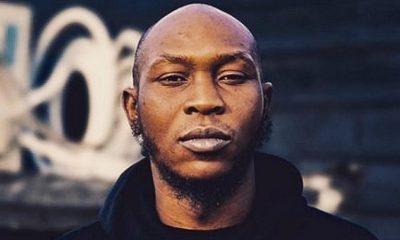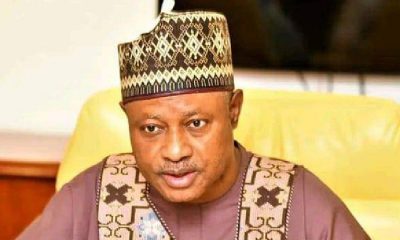Economy
Nigeria’s GDP grew by 3.46% in Q3- says NBS

Nigeria’s Gross Domestic Product (GDP) grew by 3.46% in real terms in 3rd quarter (Q3) of 2024 on a year-on-year basis.
This is according to a Monday GDP report published by the National Bureau of Statistics (NBS) which showed that the growth represents a 3.19 percent increase from the one recorded in Q2 2024.
“Nigeria’s Gross Domestic Product (GDP) grew by 3.46% (year-on-year) in real terms in the third quarter of 2024,” the NBS said. “This growth rate is higher than the 2.54% recorded in the third quarter of 2023 and higher than the second quarter of 2024 growth of 3.19%.”
“In the quarter under review, aggregate GDP at basic price stood at N71,131,091.07 million in nominal terms,” the report read.
“This performance is higher when compared to the third quarter of 2023 which recorded an aggregate GDP of N60,658,600.37 million, indicating a year-on-year nominal growth of 17.26%.”
The NBS said the growth in the GDP was driven mainly by the services sector. It said the sector had a growth rate of 5.19 per cent and contributed 53.58 percent to the aggregate GDP, underscoring its increasing importance to the country’s economy.
“The agriculture sector grew by 1.14%, from the growth of 1.30% recorded in the third quarter of 2023,” the NBS said.
The growth of the industry sector was 2.18%, an improvement from 0.46% recorded in the third quarter of 2023.
“In terms of share of the GDP, the services sector contributed more to the aggregate GDP in the third quarter of 2024 compared to the corresponding quarter of 2023.”
The NBS said in the quarter under review, Nigeria had an average daily oil production of 1.47 million barrels per day (mbpd), higher than the daily average production of 1.45 mbpd recorded in the same quarter of 2023 by 0.02 mbpd and higher than the second quarter of 2024 production volume of 1.41 mbpd by 0.07mbpd”.
“The real growth of the oil sector was 5.17% (year-on-year) in Q3 2024, indicating an increase of 6.02% points relative to the rate recorded in the corresponding quarter of 2023 (-0.85%),” the report read.
But the non-oil sector grew by 3.37% in real terms during the reference quarter (Q3 2024).
“This rate was higher by 0.62% points compared to the rate recorded in the same quarter of 2023 which was 2.75% and higher than the 2.80% recorded in the second quarter of 2024,” the NBS added.
Economy
75.5% of rural Nigerians now live below poverty line — World Bank

The World Bank has disclosed that a staggering 75.5 per cent of rural Nigerians are now living below the poverty line, reflecting deepening hardship in the country’s hinterlands.
This was revealed in the Bank’s April 2025 Poverty and Equity Brief for Nigeria, which paints a grim picture of worsening economic hardship, widening inequality, and persistent underdevelopment across much of the nation.
While poverty is widespread among urban populations, the report emphasised that the situation is significantly worse in rural areas, where economic stagnation, high inflation, and insecurity have exacerbated living conditions.
“Based on the most recent official household survey data from Nigeria’s National Bureau of Statistics, 30.9 per cent of Nigerians lived below the international extreme poverty line of $2.15 per person per day in 2018/19 before the COVID-19 pandemic,” the report stated.
The report also highlighted Nigeria’s enduring regional disparities. “Nigeria remains spatially unequal. The poverty rate in northern geopolitical zones was 46.5 per cent in 2018/19, compared with 13.5 per cent for southern ones. Inequality measured by the Gini index was estimated at 35.1 in 2018/19.
“Nigeria’s Prosperity Gap — the average factor by which individuals’ incomes must be multiplied to attain a prosperity standard of $25 per day for all — is estimated at 10.2, higher than most peers.”
Despite successive policy interventions, these figures underscore a persistent economic divide across the country.
The report’s demographic analysis found that children aged 0 to 14 years had a poverty rate of 72.5 per cent, reflecting the scale of deprivation among the youngest segment of the population.
Gender disparities were also observed, with 63.9 per cent of females and 63.1 per cent of males classified as poor under the $3.65 per day lower-middle-income threshold.
Education emerged as a significant determinant of poverty, with Nigerians lacking formal education experiencing a poverty rate of 79.5 per cent. This contrasts with 61.9 per cent for those with primary education and 50.0 per cent for secondary school graduates. Only 25.4 per cent of those with tertiary education were considered poor.
The report also drew attention to multidimensional poverty indicators, which further reflect widespread deprivation.
According to the World Bank, about 30.9 per cent of Nigerians live on less than $2.15 daily, 32.6 per cent lack access to limited-standard drinking water, 45.1 per cent do not have limited-standard sanitation, and 39.4 per cent have no electricity.
Education access remains a challenge, with 17.6 per cent of adults yet to complete primary education, and 9.0 per cent of households reporting at least one school-aged child not enrolled in school.
The report noted that even before the COVID-19 pandemic, efforts to reduce extreme poverty had largely stalled.
“Before COVID-19, extreme poverty reduction had almost stagnated, dropping by only half a percentage point annually since 2010. Living standards of the urban poor are hardly improving, and jobs that would allow households to escape poverty are lacking,” the report read.
Although the World Bank acknowledged recent economic reforms aimed at stabilising Nigeria’s macroeconomic outlook, it warned that persistently high inflation continues to undermine household purchasing power, particularly in urban areas where incomes have not kept pace with rising costs.
In light of the worsening situation, the Bank called for urgent policy action to shield vulnerable groups from inflationary shocks and to drive job creation through more productive economic activities.
Economy
Naira Records Marginal Decline Against Dollar at Official Market

The Nigerian naira experienced a mild drop in value on Friday, closing at ₦1,602.18 per dollar in the official foreign exchange market, based on figures released by the Central Bank of Nigeria (CBN).
This marks a decrease of ₦5.49 from the rate of ₦1,596.69 recorded on April 30, the last trading day before the May 1 Workers’ Day holiday—indicating a depreciation of approximately 0.34%.
Earlier in the week, from Monday to Wednesday, the naira remained relatively stable, exchanging at ₦1,599.95, ₦1,599.71, and ₦1,596.69 respectively.
Although the local currency showed some consistency mid-week, it wrapped up the week with a loss, following a sligh dip of 0.02% at the beginning of the week
Economy
Black Market Dollar hits N1,610 Amid Economic quagmire

What is the Dollar to Naira Exchange Rate in the Black Market (Also Known as the Parallel Market or Aboki FX)?
Below is the black market exchange rate for the U.S. dollar to the Nigerian naira as of Thursday, May 1, 2025. These are the typical rates at which you can exchange dollars for naira:
Dollar to Naira Black Market Exchange Rate (May 1, 2025):
At the Lagos Parallel Market, also referred to as the black market, Bureau De Change (BDC) operators are buying dollars at ₦1,602 and selling at ₦1,610, according to market sources.
Please note: The Central Bank of Nigeria (CBN) does not recognize or endorse transactions conducted on the parallel market. The CBN advises individuals and businesses seeking foreign exchange to use official banking channels.
-

 News16 hours ago
News16 hours agoWhy ‘VeryDarkMan was arrested – EFCC
-

 Education19 hours ago
Education19 hours agoOver 1.5m candidates score less than 200 in 2025 – UTME
-

 Entertainment16 hours ago
Entertainment16 hours agoHow I narrowly escaped death in U.S hotel room – Seun Kuti
-

 News18 hours ago
News18 hours ago‘S3x is good, I enjoy it,’ Bishop Adejumo tells wives
-

 News13 hours ago
News13 hours agoReps Minority Caucus condemns unlawful detention of VDM, demands his immediate release
-

 News20 hours ago
News20 hours agoTinubu to meet Gencos over N4tn electricity debt
-

 News21 hours ago
News21 hours agoA Year After: Rt. Hon. Nnolim Nnaji Reflects On Late Senator Ayogu Eze’s Life
-

 News19 hours ago
News19 hours agoKaduna gov donates SUVs to monarchs, urges unity, peace


















